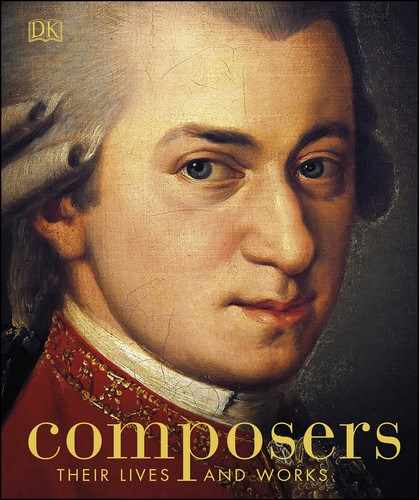John Dowland
1563–1626, ENGLISH
Dowland was an outstanding lutenist and songwriter. His immense talent was reflected in the plaintive, bittersweet melodies for which he became famous throughout Renaissance Europe.

JOHN DOWLAND
Dowland is shown here, lute and quill in hand, with the sad and doleful expression for which, by all accounts, he was well known. Indeed, many of his darker works tap into the vogue for melancholy that was characteristic of his age. This was not considered to be a negative emotion, but an indicator of deep and meaningful thought.
IN CONTEXT
A climate of treason
In 1570, Pope Pius V excommunicated Elizabeth I, releasing her Catholic subjects from allegiance to her. This sparked plots against her life, among them the Ridolfi Plot (1571) and the Babington Plot (1586). In response, Elizabeth employed secret agents to help unearth possible conspirators, at home and abroad. These activities were supervised by her “spymaster,” Francis Walsingham, and secretary of state, Robert Cecil. It was to Cecil that Dowland wrote when, following an incident in Italy, he became fearful that he would be accused of treason.

ROBERT CECIL, 1ST EARL OF SALISBURY
Nothing is known for certain about John Dowland’s early days. He is first documented in 1580, when he was in Paris, serving as a retainer in the household of the English ambassador, Sir Henry Cobham. John had probably already learned to play the lute in an aristocratic household of this kind. While in France, he took the fateful step of converting to Catholicism—a move that would have a profound effect on his future career.

PAGES FROM THE FIRSTE BOOKE OF SONGES OR AYRES
The original, 1597 edition of John Dowland’s highly successful Firste Booke of Songes or Ayres is shown here, with its innovative “table layout.”
Home and abroad
Dowland returned to England in the mid-1580s and earned a music degree at Oxford University. He also married and had a son. In music circles, his reputation was growing. Some of his songs were performed at royal entertainments and, in 1594, he felt confident enough to apply for a vacant post as a court lutenist. He was rejected, however—apparently because of his faith. Dowland was downhearted at this and, leaving his family behind in England, he decided to seek his fortune abroad.
Dowland’s travels took him to princely courts in Germany and Italy, where he was received enthusiastically and showered with expensive gifts to send to his wife—a gold chain and clothing from the duke of Brunswick; a gold ring and cup from the landgrave of Hesse. In Italy, though, he ran into a group of disaffected Catholics, who seemed to be plotting against Elizabeth I (see box). Dowland immediately took fright. He wrote a long, rambling letter to Robert Cecil, the secretary of state, assuring him of his loyalty to Elizabeth and offering his services as a spy. What the authorities made of this somewhat paranoid missive is not recorded, but it certainly did not help Dowland’s job prospects.
He returned to England in 1597, still hoping for royal preferment, but once again he was overlooked. Dowland profited from the visit, however, by publishing his groundbreaking collection, The Firste Booke of Songes or Ayres. This proved hugely popular, in part because of its ingenious “table layout,” which enabled musicians or singers to stand around a small table and read their parts from a single text.

ELSINORE, DENMARK, c. 1600
Dowland was in Denmark from 1598 to 1606, when relations between England and Denmark were tense, especially on the issue of fishing rights. He was hired not only as a lutenist, but as a negotiator and messenger between the two countries.
A novel combination
The songs themselves were equally novel. Dowland blended elements from the madrigal, the consort song, and the broadside ballad to create exquisitely plaintive melodies. These display a bittersweet melancholy that was then highly fashionable, typified by titles such as “In darkness let me dwell” and “Welcome, black night” (a wedding song). Dowland published three books of his songs, along with the extraordinary Lachrimae (Tears, 1604). The latter features seven variations of his most famous song, “Flow, my tears.”
These books helped make Dowland one of the most famous musicians in Renaissance Europe. He was particularly successful as the court lutenist in Denmark, where Christian IV paid him an exorbitant salary. Dowland was never valued as highly in his homeland, although he did belatedly receive a royal appointment from James I in 1612.
